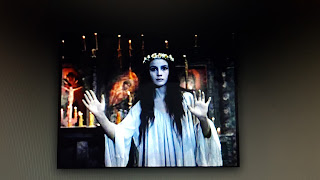"All evil and impure passions have been conceived by evil spirits and they have been permitted to visit attacks upon man. But they are unable to force anyone for it is in our power either to accept the visitation or not." - Saint John of Damascus.
The Calvert Journal is a wonderful website. It's one of a select few I check on pretty much a daily basis. Travel reports from places like Wroclaw and Yoshkar-Ola share space with Eastern European news and culture reports and photographs of the Aral Sea and Russian quidditch tournaments. I've written, before, about last year's Things Fall Apart exhibition in their Shoreditch home but I'd been seriously intrigued by a piece by Sasha Raspopina in the run up to Hallowe'en recommending horror films from the 'New East'. I'd never seen any of them and the only ones I'd heard of were two Czech films, the phantasmagoric sexual horror Valerie and her Week of Wonders and the surrealist stop-motion piece Little Otik.
Films like the erotic Croatian tale of paranoia, Izbavitelj (The Rat Saviour), and Gongofer, the mystical Russian road movie, certainly pricked my interest. I vowed, if possible, to watch them all and as I tend to employ a methodical approach to these projects I began with 1967's Viy which started Raspopina's list. It's often celebrated as being the USSR's only horror movie but that's not strictly true as after perestroika the Russian film industry opened up to making thrillers. However, it still stands as the first, and as a symbol of, Soviet horror and was even remade in 2014.
The past fifty years have rendered some of the special effects a little silly but what's more noticeable is how the film moves along at a much slower pace than we've come to expect these days. It may take time for the story to develop but it creates a depth, and an unease, that is all too rare and is a treat to discover.
Leonid Kuravylov plays Khoma, a young seminary student who seems more interested in searching out the next glass of vodka than his religious obligations. His rector dispatches him to a farm in the countryside surrounding Kiev to pray for the soul of a rich merchant's daughter who is dying and has requested Khoma personally by name.
Before he arrives the girl dies and her father promises Khoma huge material rewards if he stands vigil over her dead body and pray for her soul in a locked church for three nights. Khoma takes great courage in three things. Being a Cossack, his religion, and his taste for the booze. But will these things help, or hinder, him as, inevitably, strange things start happening during the dead of night?
The film's adapted from a short story by 19th century Ukrainian born Russian writer Nikolai Gogol. Gogol, in his story, suggested that it was merely an adaptation of a traditional Ukrainian folkloric tale, possibly relating to St Cassian the Unmerciful, but this is believed merely to be a literary device intended to bring the fear home more effectively.
Despite some unsettling eeriness it's highly unlikely you'll need to hide behind your sofa. It's just not that scary. That doesn't detract (much) from the film's greatness though. The screenwriter Aleksandr Ptushko was known as the Soviet Walt Disney but his work in this film tips its ushanka more in the direction of Ray Harryhausen. Karen Khachaturian's soundtrack is another plus. The nephew of leading Soviet composer Aram Khachaturian allows the tension to build slowly and subtly by judiciously paring back the score when required.
It's the right feel for the film and there is a lot that is right about this film. Viewed as a straightforward horror it may not quite hit the mark but taken as a meditation on faith and overcoming one's demons and fears it is a surprisingly serious piece of work and one that asks more questions than it answers.
Why is Khoma in the seminary in the first place? Are the grotesque creatures he sees real, real to him, hallucinations, or ciphers? Is the film craftily poking fun at Russia's love affair with authoritarianism? Certainly the way first the rector, and then the moneyed father of the dead girl, threaten Khoma with the lash suggests so. We don't see Khoma getting lashed so much as see him out on the lash singing drinking songs and crashing out in hay bales. Was this social comment, by directors, Konstantin Yershov and Georgi Kropachyov, about Soviet attitudes to alcohol?
These are things I'm unlikely to ever find out but it doesn't really matter. Not all questions need an answer so pour yourself a glass of Stolichnaya, butter your blinis, and prepare yourself for a trip into the dark heart of Ukrainian horror. I'll be back with more of this soon..








No comments:
Post a Comment